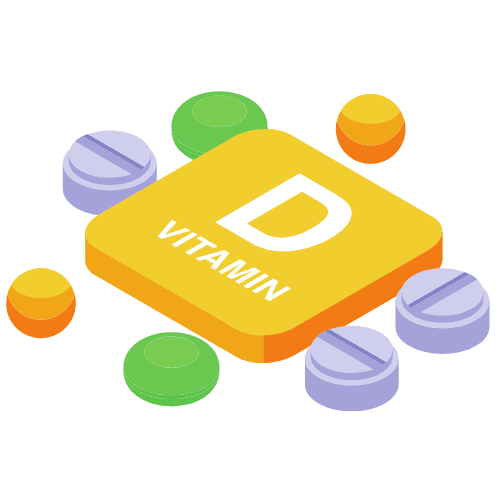Although you may have heard that too much vitamin D can be harmful, you may not know how much your body actually needs on a daily basis. In fact, the recommended dose for vitamin D varies based on a person’s sex. Unfortunately, many women are not sure how to get the right amount of this essential nutrient.
So, how much Vitamin D per day for a woman is optimal? That depends on a few factors. In this blog post, we’ll discuss the factors and take a closer look at how much vitamin D per day is necessary for women.
How Much Vitamin D3 Per Day for a Woman is Optimal?
The recommended daily intake of vitamin D3 for women aged 14 to 70 is 600 IU per day.
Women 71 and older need slightly more so aim for 800 IU per day.
Vitamin D: Role in Women’s Health
Apart from sun exposure, Vitamin D is present in certain foods such as egg yolks, red meat, orange juice, and fatty fish like salmon and sardines.
Women are usually more prone to developing health conditions that affect the bones because of low Vitamin D levels. This is why taking supplements of Vitamin D is vital for women.
1. Healthy Bones
Compared to men, women’s bones are smaller and thinner in structure. The female body produces a hormone called estrogen, which is essential for bone health. When a woman reaches menopause, the levels of estrogen decrease, and the bones are exposed to damage.
As Vitamin D is a great source of bone health, taking these supplements becomes crucial for women as they get older. Good enough amounts of Vitamin D will ensure strong bones and a lower risk of osteoporosis.
2. Boosts Immune System
Studies and research suggest that women have a stronger immune system compared to men. To enhance that immunity, Vitamin D plays a huge role. This substance helps to absorb the necessary elements that are required for increased immune functionality. As a result, disease control becomes much easier.
3. Helps with Weight Loss
More and more women nowadays are concerned about lowering their body weight and try many different diet methods to accomplish this. But what most women forget is the necessity of incorporating Vitamin D and other essential elements into their diet.
Naturally occurring Vitamin D is in very few foods, which is why it is desirable to take Vitamin D supplements.
Research suggests that Vitamin D helps burn body fat and decrease the risk of cardiovascular disease. So if you’re a female and on a diet plan, make sure to take that Vitamin D supplement!
Additional Health Benefits
Remember when you were a little girl, and your mother always made you eat fish and liver? It is because these are rich sources of Vitamin D and are vital for a woman’s growth. As females get periods, Vitamin D helps replenish the lost nutrients and energy gone with menstrual blood.
Enough Vitamin D in blood levels helps combat many health problems such as bone pain, muscle aches, and even hypertension. Keeping Vitamin D levels stable from a young age leads to being healthy adults with a low risk of heart disease.
How Much Vitamin D Should a Woman Take?

We have seen many health benefits of the sunshine vitamin and how undoubtedly important it is for a woman’s well-being. Though Vitamin D deficiency is harmful, too much Vitamin D is potentially dangerous.
So, like all other essential substances, the Vitamin D level in the body needs to be kept in check.
Not a lot of foods are naturally rich in Vitamin D – not even fortified foods like breakfast cereals. Hence, it is important for a woman to take supplements to ensure enough Vitamin D is in her blood levels to stay healthy. So let’s see what health professionals have to say about controlled amounts of this essential nutrient.
- Age Is a Factor
Based on various national institutes, 4,000 IU (international units IU) is considered to be the safe upper limit of daily Vitamin D intake. This amount was medically reviewed by specialists. Elderly women over 70 years need more Vitamin D compared to teenagers and younger women.
The recommended dietary allowance for older women is around 800 IU daily. For females below this age group, 600 UI is the daily recommended intake to prevent Vitamin D deficiency.
- Let There Be (Sun)Light
Scientific references say that summer sun exposure for about ten minutes every day can help to fight Vitamin D deficiency. However, one should always be careful when going in direct sunlight as those UV rays are not particularly friendly.
Women with lighter skin are at higher risk of developing skin cancer because of the harmful UV rays. This has been proven by many studies, including those from Harvard Medical School. Darker skin tones have more melanin, which can block out the rays. Using sunscreen is a good way to stay safe from the sun.
Frequently Asked Questions about Vitamin D
What happens if you take too much Vitamin D?
An excess of Vitamin D leads to increased accumulation of calcium in blood levels. This is known as Vitamin D toxicity. Ironically, a surplus of Vitamin D leads to developed cancer, kidney stones, nausea, and other health conditions.
Do non-Caucasians need more Vitamin D?
A person with a darker skin tone has more melanin, which cannot absorb a lot of Vitamin D from the sun. So they will need longer exposure to sunlight and more supplements to fill this gap.
Are all Vitamin D supplements effective?
D2 and D3 are the two forms of Vitamin D supplements that are available on the market. Both types have been proven to function equally and effectively.
Can there be side effects of Vitamin D?
Excessive Vitamin D in blood levels can cause constipation, headaches, fatigue, and in extreme cases – kidney failure.
Conclusion
Women usually need different amounts of nutrients compared to men because of the difference in biological structure. The case is no different when it comes to Vitamin D intake. While it is an essential substance needed for healthy bones and muscles, it is necessary to check how much is consumed on a daily basis.
Too much of this vital nutrient is equally harmful as too little of it. And as many factors are involved in deciding how much Vitamin D is needed by women every day, it is best to get advice from a healthcare professional.
Disclaimer: this article does not constitute or replace medical advice. If you have an emergency or a serious medical question, please contact a medical professional or call 911 immediately. To see our full medical disclaimer, visit our Terms of Use page.
Related Articles
Best Vitamin D3 and K2 Supplements






